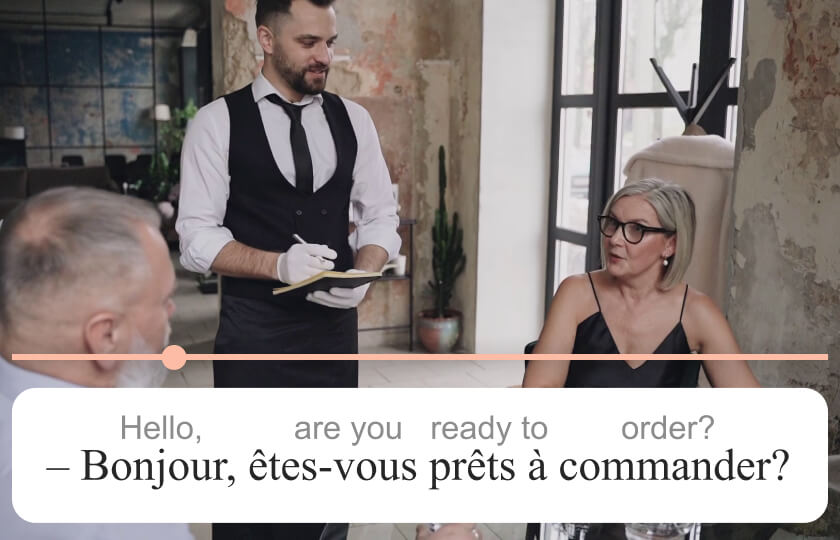
Starting to learn French is an exciting step! Whether you’re captivated by French culture, getting ready for a trip, or just love learning new languages, picking up some basic French words and phrases is a great start.
Even if you’re a complete beginner, these essentials will boost your confidence and help you communicate. Plus, when you travel to France, knowing a bit of the language will make your experience much richer and show your respect for French culture. Let’s dive into some beginner words that will get you on your way!
Table of contents
- Greetings and basic words
- Basic phrases
- Directions and transportation
- Common places
- Ordering food
- Numbers
- Emergency phrases
- Common adjectives
- Pronouns
- Basic grammar
French greetings and basic words
When starting to learn French, mastering basic greetings and common words is essential. This simple list will help you navigate daily interactions and make a good impression.
- Bonjour – Hello
- Salut – Hi (informal)
- Au revoir – Goodbye
- Bonsoir – Good evening
- Bonne nuit – Good night
- S’il vous plaît – Please
- Merci – Thank you
- Merci beaucoup – Thank you very much
- Je vous en prie – You’re welcome
- De rien – You’re welcome (informal)
- Oui – Yes
- Non – No
- D’accord – Okay
- Monsieur – Mister
- Mademoiselle – Miss
- Madame – Missis
- Enchanté – Nice to meet you
- Excusez-moi – Excuse me
- Pardon – Sorry
- Bonne journée – Have a good day
- À bientôt – See you soon
- À demain – See you tomorrow
Learning these basics will not only help you get by in France but will also show locals that you’re making an effort to speak their language. Keep practicing these words, and soon you’ll feel more confident in your speaking abilities.
Basic French phrases
To effectively navigate conversations in French, it’s helpful to learn a few key phrases. These expressions will be useful in a variety of situations.
- Je ne parle pas français – I don’t speak French
- Parlez-vous anglais? – Do you speak English?
- Je ne comprends pas – I don’t understand
- Répétez s’il vous plaît – Repeat please
- Comment tu t’appelles? – What is your name?
- Je m’appelle… – My name is…
- Je viens des États-Unis… – I’m from the United States
- Comment ça va? – How are you?
- Ça va bien, merci – I’m good, thank you
- Pouvez-vous m’aider? – Can you help me?
- Combien ça coûte? – How much does it cost?
- Je voudrais… – I would like…
- Aidez-moi – Help me
- Je suis désolé – I’m sorry
- Qui a tué Kennedy? – Who killed Kennedy?
Directions and transportation
Getting around in France is much easier when you know some basic French words related to directions and transportation. Here are some essentials to help you navigate.
- Où est…? – Where is…?
- L’avion – Plane
- Le bus – Bus
- Le train – Train
- Le taxi – Taxi
- La voiture – Car
- La moto – Motorcycle
- Le bateau – Boat
- Le navire – Ship
- L’aéroport – Airport
- L’arrêt de bus – Bus stop
- La gare – Train station
- Le métro – Metro
- Le billet – Ticket
- À droite – To the right
- À gauche – To the left
- Tout droit – Straight ahead
- Le plan – Map
- La rue – Street
- La place – Square
- Le carrefour – Intersection
- L’horaire – Schedule
These words and phrases will help you ask for directions, understand responses, and navigate public transportation. With these under your belt, you’ll be able to travel more confidently and independently.
Common places in French
Knowing the names of common places is essential for navigating and finding your way around in an unfamiliar area. Here are some important words.
- La banque – Bank
- L’hôpital – Hospital
- Le magasin – Store
- Le supermarché – Supermarket
- Le marché – Market
- Le centre commercial – Shopping mall
- L’école – School
- Le musée – Museum
- La pharmacie – Pharmacy
- La boulangerie – Bakery
- Le bureau de poste – Post office
- La station-service – Gas station
- La plage – Beach
- Le stade – Stadium
Ordering food in French
Dining out in a French restaurant is a delightful experience, and knowing some basic French can make it even better. Here are some essential phrases to help you order food and drinks:
- Une table pour deux – A table for two
- Le menu s’il vous plaît – The menu, please
- Je voudrais… – I would like…
- Quel est le plat du jour? – What is the dish of the day?
- Je suis végétarien – I am vegetarian
- Sans gluten – Gluten-free
- L’addition s’il vous plaît – The bill, please
- Le pourboire – The tip
Here are some common food and drink names:
- L’eau plate – Still water
- L’eau gazeuse – Sparkling water
- Un café – A coffee
- Le vin rouge/blanc – Red/white wine
- Le pain – Bread
- Le fromage – Cheese
- La viande – Meat
- Le poisson – Fish
- Le poulet – Chicken
- Les légumes – Vegetables
- Les fruits – Fruits
- L’entrée – Starter
- Le plat principal – Main course
- Le dessert – Dessert
These words and phrases will help you communicate your preferences, ask questions about the menu, and ensure you have an enjoyable dining experience. Bon appétit!
Numbers
Understanding numbers is crucial for various daily interactions, from shopping to making reservations. Here are the basic French numbers you’ll need to know:
- Un – One
- Deux – Two
- Trois – Three
- Quatre – Four
- Cinq – Five
- Six – Six
- Sept – Seven
- Huit – Eight
- Neuf – Nine
- Dix – Ten
- Onze – Eleven
- Douze – Twelve
- …
- Vingt – Twenty
- Cent – Hundred
- Mille – Thousand
These numbers will help you with tasks such as telling time, handling money, and understanding addresses. Practice them often to become comfortable using numbers in your daily interactions.
Emergency phrases in French
In case of emergencies, knowing some French phrases can be incredibly helpful. Here are essential phrases to use in urgent situations:
- Aidez-moi – Help me
- C’est une urgence – It’s an emergency
- Appelez un médecin – Call a doctor
- Où est l’hôpital? – Where is the hospital?
- Je suis perdu – I am lost
- Je suis blessé – I am injured
- Je me sens mal – I feel unwell
- J’ai été volé – I’ve been robbed
- Le commissariat de police – The police station
These phrases will help you communicate effectively during emergencies and get assistance fast, even if you just had a little too much wine at dinner.
Common French adjectives
Adjectives are essential for describing people, places, and things. Here are some of the most common adjectives you’ll encounter:
- Grand – Big/Tall
- Petit – Small
- Bon – Good
- Mauvais – Bad
- Beau – Beautiful
- Nouveau – New
- Vieux – Old
- Cher – Expensive/Dear
- Bon marché – Cheap
- Heureux – Happy
- Triste – Sad
- Froid – Cold
- Chaud – Hot
French pronouns
Pronouns are essential for expressing yourself clearly in any language. They help you replace nouns, making sentences shorter and more natural. Here are the most common French pronouns you’ll need to know:
- Je – I
- Tu – You (informal)
- Vous – You (formal or plural)
- Il/Elle – He/She
- Nous – We
- Ils/Elles – They (masculine/feminine)
- Me/Moi – Me
- Le/La – Him/Her (direct object)
- Lui – Him/Her (indirect object)
Want to learn more? Check out our article on the most common French phrases.
Basic French grammar
French grammar may seem tricky at first, but with a few key concepts, you’ll be able to form simple sentences and communicate more effectively.
- French nouns have genders, either masculine or feminine. For example, “book” is masculine as “le livre” and “table” is feminine as “la table.” Plural nouns use “les” regardless of gender.
- French verbs change form based on the subject. For instance, the verb “to speak” (parler) is “je parle” for “I speak,” “tu parles” for “you speak,” and “il/elle parle” for “he/she speaks.”
- Adjectives in French must agree in gender and number with the nouns they describe. For example, “a green book” is “un livre vert,” while “a green table” is “une table verte.”
- To form a negative sentence, place “ne” before the verb and “pas” after it. For example, “I do not understand” is “Je ne comprends pas.”
- To ask a question, you can invert the subject and verb, such as “Parlez-vous français?” (Do you speak French?), or use “Est-ce que” before a statement, like “Est-ce que vous parlez français?” (Do you speak French?).
Wrapping up
Don’t stress about learning everything at once, and don’t worry about making mistakes. Use this article as a stepping stone to pick up the language. Practice a bit each day, and you’ll see steady progress. Every new word you learn brings you closer to better communication.
The words and phrases we’ve covered are just the start. There are many more fascinating topics to discover in French. To streamline your learning journey, try this French learning app. It makes learning easy and fun, offering hands-on practice. Happy learning!

